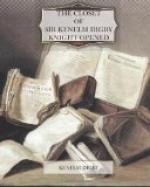“Hee, that all med’cines
can exactly make,
And freely give them.”
Evelyn records how Digby “advised me to try and digest a little better, and gave me a water which he said was only raine water of the autumnal equinox exceedingly rectified, and smelt like aqua fortis.”
Here, at last, we have come to the end of Sir Kenelm the amateur. If he was an empiric, so were all the doctors of his time; and he may be described as a professional unpaid physician who carried on a frequently interrupted practice. That he did not publish his receipts himself does not reflect on his own idea of their importance. They had a wide circulation among his friends. And, as I have pointed out, he never showed great eagerness to publish. Such works as appeared in his lifetime were evidently printed at the request of learned societies, or by friends to whom they were dedicated, or by White.
The distance between the healer and the cook has grown to be immense in recent times. The College of Physicians and Mary Jane in the kitchen are not on nodding terms—though one sees faint signs of an effort to bridge the wide gap. But in the seventeenth century the gap can hardly be said to have existed at all. At the back of the doctor is plainly seen the figure of the herbalist and simpler, who appear again prominently in the still-room and the kitchen, by the side of great ladies and great gentlemen, bent on making the best and the most of the pleasures of the table no doubt, but quite as much on the maintenance of health as of hospitality. Simpler, herbalist, doctor, distiller, cook—Digby was all of them, and all of them with the utmost seriousness; nor in this was he in the least singular. The great Bacon was deeply concerned with such cares, though in certain of his recommendations, such as: “To provide always an apt break-fast,” to take this every morning, not to forget to take that twice a month, one may read more of the valetudinarian than in Digby. The Closet Opened is but one of an interesting series of books of the kind, which have been too much neglected by students of seventeenth-century manners and lore and language. Did not W.J. issue the Countess of Kent’s Choice Manual of Physic and Chirurgey, with directions for Preserving and Candying? Patrick, Lord Ruthven’s Ladies’ Cabinet Opened appeared in 1639 and 1655.




